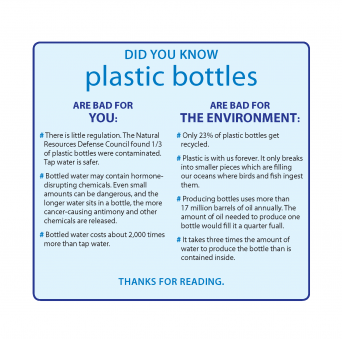Spread the Word: Friends Don’t Let Friends (or Even Folks They Just Met) Buy Water in Plastic Bottles
In our political climate, when it is easy to feel depressed and helpless, I have a suggestion. Since the present administration is hell-bent on plundering our resources and removing regulations, I ask that you consider doing something for the environment. It may seem small, but we have to begin somewhere to make change.
You probably already know how detrimental plastic bottles are to the environment. However, there are many people who may not be aware of the damage they are doing by using plastic water bottles. According to a study by Madison County, N.C., Americans use 2.5 million plastic bottles every hour!
You may be under the illusion that most plastic bottles are recycled, when in fact, the number is only about 23 percent. According to Tom Szaky, CEO of TerraCycle, which targets hard-to-recycle waste, only half of what you put into your blue bin actually ends up recycled, usually because of contamination. Even bottles that do get recycled may not be used for post-consumer material because it is more expensive to produce. (When you do recycle a plastic bottle, empty it completely, which makes recycling easier, and put the cap back on, as recyclers want this more valuable plastic.)
What motivates me is knowing that virtually all the plastic ever produced still exists today in some form. Millions of trillions of tiny pieces are settling in our oceans, where birds and fish consume them and suffer or die. These are the same fish we may eat later, plastic and all. According to the Ellen MacArthur Foundation, there will be more plastic in the ocean than fish, by weight, in 2050.
So what are we going to do? It’s not enough that you and I avoid plastic bottles whenever possible. How can we stop this avalanche of plastic clogging our oceans and landfills?
I invite you to join me in trying to educate others.
I was in the supermarket recently and saw a man with three cases of plastic water bottles. I engaged him with a comment, “You drink a lot of water.” Trying not to be rebarbative, I asked if he knew that bottled water wasn’t tested often and that tap water was safer. He then explained that he used to drink soda, which ruined his health, so he is sticking to water. If he were in better health — he clearly had undergone a tracheotomy — I might have pursued the topic. I wish I had had a handout to give him, so he could consider his choice later in the comfort of his home.
So I’ve included a handout below. While you can talk to friends or even strangers you see buying cases of plastic water bottles, you might have a greater impact at public or private events — block parties or church functions or school gatherings — with a handout.
You would be surprised how amenable people are. You could ask your gym or workplace to have water fountains instead of bottled water. Last year I spoke to the director of my granddaughter’s nursery school; this year there were no plastic bottles at their main school event. I frequently speak to race directors because some races may use thousands of bottles. I have had some success.
One note: Bottle deposits do help. California’s deposit system is linked to a 65-70 percent recycling rate. Texas, in contrast, with no deposit, recycles less than 5 percent. Germany requires packaging companies to pay for the environmental cost of packaging. In the United States, 11.3 million tons of packaging fill our landfills. Maybe one day we’ll have bottle deposits or a packaging tax in Pennsylvania. For now, I am relieved Gov. Tom Wolf vetoed the bill that would have prevented municipalities in the state from banning plastic bags.
I hope you’ll join me in trying to educate others, especially groups which tend to use large quantities of water bottles. Download the handout at www.weaversway.coop/plastic-bottle-handout and take it to your next event.

